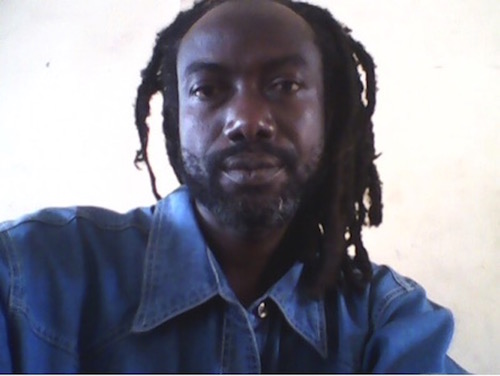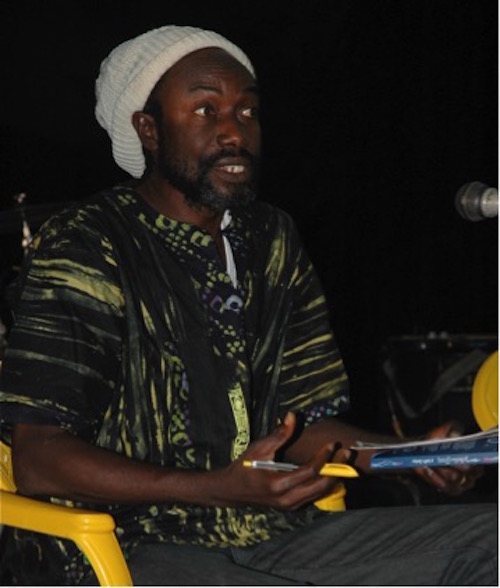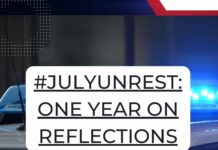In the Weekly Dissident today, MPHUTLANE wa BOFELO engages with Nigerian trade unionist, teacher, poet and Trotskyist socialist, AJ Dagga Tolar.
MwB: Who is Dagga Tolar and what is his philosophy of life?
AJ DT: I am human, this is the only qualification that has made it possible for me to be who I am. Male, black, African, Nigerian, socialist, Trotskyite, poet, teacher, trade unionist, whatever category or boxes you want to enclose me in, the fact of my humanness made room and space for me to be any of this or all of these. So, AJ Dagga Tolar is simply then me – a being whose fortunes are defined by the harvest of a conscious materialist philosophy as his guide to life.
It is this materialist ideas of dialectics, the very underpinning of the whole of nature, that fully defines who I am. This is how I have come to see and understand life and my role in it, as a conscious act of professing Marxism as the armour with which the working masses can, through the class struggle, confront and end the rule of capital. Only then can humanity truly commence using the resources of society and nature to meet the needs of all, instead of just meeting the greedy need of the profit of capitalist sharks.
MwB: What are the personal and social experiences that brought you into writing and political activism, and into Marxism in particular?
AJ DG: My father provided my first step into literacy through his radical disposition and natural hatred for exploitation and his refusal to be cheated. He was always the first around to voice his opposition to such tendencies and this provided me with an indirect route into political activism. Marxism was a later discovery. The root was a fervent love for reggae music as exemplified by the songs of Bob Marley and Peter Tosh: summed up in that classic song of “Get Up, Stand Upâ€.
This was my first conscious political education, that took me into the deep study and practice of the faith of Rastafari.
My first attempt at song writing was no more than a rehash of my loved reggae songs. Of import is that I had been seduced into the art of lyricism.
The university experience helped to challenged me into a poet. Since I was already a songwriter I wondered, what was in a poem that was so special and erudite that I was not yet doing in my songwriting? I wanted to wear the tag of a poet. And I simply took pen and saw that I only had to battle with words, and not necessarily with rhythm. Of course I was naïve and assumed that a song required harmony and internalised rhythm in it is composition and that a poem was even more simple and didn’t required them.
In 1987 I wrote my first poem to be read out at a literary event organised by the Creative Mind Association/English and Literary Student Association. Since then I have come to a full consciousness of the import of the poetic art as an instrument of building consciousness, and I am a living testament of this.
Reggae Music recruited me into the politics of change and revolution. Fela Anikulapo-Kuti even came later, despite the fact that we shared the same living space in Nigeria. Rasta was my route to Marxism.
MwB: Some would argue there is more than one Karl Marx or rather multi-fold currents of Marxism; which Karl Marx are you in harmony with and how does he fit into the specificities of today’s Nigeria, Africa and the world?
AJ DG: In Africa and in the neocolonial world, the so-called independence of flag rule has fundamentally changed nothing, just as black rule or the end of apartheid in South Africa has not fundamentally changed the fortunes of the working masses.
This is the whole import of Bolshevism, to advance Marx’s prognosis that a socialist revolution can be made in a backward country, given that in the age of imperialism, what is now dressed up as globalisation has integrated the whole world into a single unit for capitalist exploitation.
Trotsky’s theory of Permanent Revolution is key to understanding how revolution can and will be made in the neocolonial world. It states that the working masses only can provide the leadership for the making of the revolution, the bourgeoisie are no longer capable of leading a revolution to confront its inherent interest with tyranny given the benefits that accrued to it from it rule and the oppression of the working masses.
Only the working masses under their own political banner, programme and leadership, with the alliance and support of stratas of the poor, can complete the task of the bourgeois revolution as the first task of the socialist revolution. This was the path to the making of the Russian revolution: any other programme will have denied humanity and history the benefit of this all-important victory of the working masses.
And this is key for Nigeria, Africa and the whole of the neocolonial world.
MwB: What vision of a different Nigeria and a different world do you have and how do you propose that can be attained?
AJ DG: Obviously Nigeria is missing it – not with electricity capacity generation currently at 2,946MW for a country with more than 180 million citizens. With this base, we cannot start with anything compared to South Africa, which has a population of 51 million and generation capacity of 45,000MW.
The fact that Nigeria is a major oil-producing country without any functional refinery says much of how profit-making comes first for the ruling elites, rather than meeting the needs of the working masses. The profit made from importing fuel for domestic usage is so much that the bourgeoisie in Nigeria will continue to support a regime that will not attempt to construct new refineries even with all of the wealth of the country.
The fact is that Nigeria does not need or require private or foreign capital to generate electricity or build a refinery or even to develop the economy – it can muscle the necessary resources from itself, given its vast wealth – but this is the very antithesis of capitalism and the very basis for corruption in Nigeria. As long as the country continues to generate enormous wealth and arm itself with the philosophy of private or foreign capital as the be all and end all economic development, the ruling elites will feel free to loot the wealth of the state.
Without a socialist revolution Nigeria cannot begin to turn around its fortunes. The 2015 general elections will also not fundamentally change anything, given the fact that whoever wins will govern society under the same ideas of capitalism that have ruined us to date.
The ideas of Marxism and socialist revolution, and the building of a mass political organisation of the working people, remain the only way forward for the working class.

![Daggar Tollar 2 [slider]](https://www.thedailyvox.co.za/wp-content/uploads/2015/01/Daggar-Tollar-2-slider.jpg)









